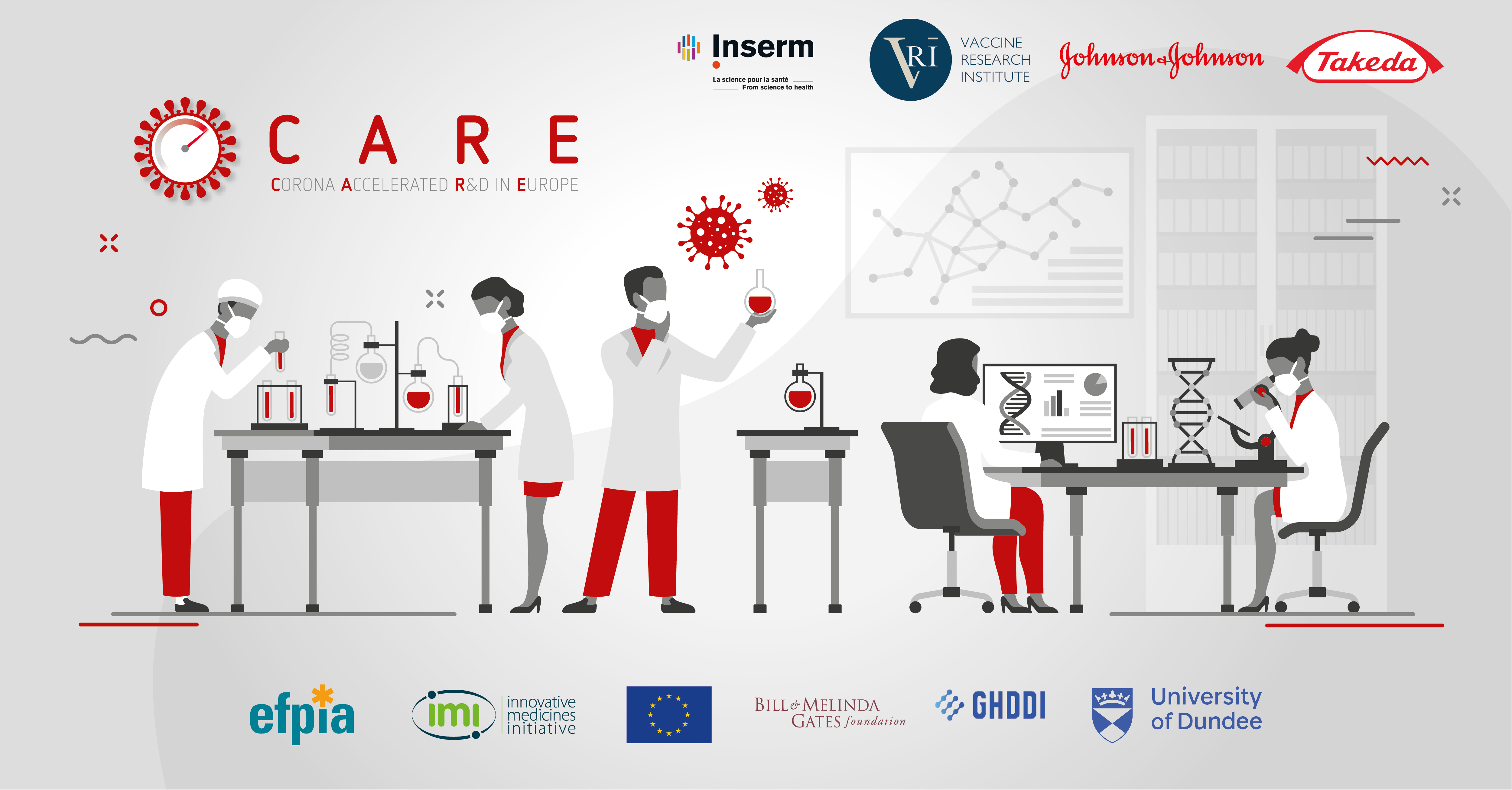Europe’s Largest Initiative Launches to Accelerate Therapy Development for COVID-19 and Future Coronavirus Threats
· CARE (Corona Accelerated R&D in Europe), supported by Europe’s Innovative Medicines Initiative (IMI), is the largest undertaking of its kind dedicated to discovering and developing urgently needed treatment options for COVID-19.
· The initiative is committed to a long-term understanding of the disease and development of therapies for COVID-19 and future coronavirus threats in addition to urgent efforts to repurpose existing therapies as potential immediate response.
· The CARE consortium will accelerate COVID-19 R&D by bringing together the leading expertise and projects of 37 teams from academic and non-profit research institutions and pharmaceutical companies into a comprehensive drug discovery engine.
 Brussels, Belgium – 18 August 2020 – CARE (Corona Accelerated R&D in Europe) a new consortium supported by the Innovative Medicines Initiative (IMI) public-private partnership announced its launch today to accelerate the discovery and development of urgently needed medicines to treat SARS-CoV-2, the virus that causes COVID-19. With a grant totaling € 77.7 million, CARE is funded by cash contributions from the European Union (EU) and cash and in-kind contributions from eleven European Federation of Pharmaceutical Industries and Associations (EFPIA) companies and three IMI-Associated Partners. CARE is a five-year project bringing together 37 partners from Belgium, China, Denmark, France, Germany, the Netherlands, Poland, Spain, Switzerland, the UK and the US, and is led by VRI-Inserm (French National Institute of Health and Medical Research, Paris, France), Janssen Pharmaceutica NV, one of the Janssen Pharmaceutical Companies of Johnson & Johnson (Beerse, Belgium), and Takeda Pharmaceuticals International AG, (Zurich, Switzerland). It integrates partners’ COVID-19 projects ongoing since February 2020.
Brussels, Belgium – 18 August 2020 – CARE (Corona Accelerated R&D in Europe) a new consortium supported by the Innovative Medicines Initiative (IMI) public-private partnership announced its launch today to accelerate the discovery and development of urgently needed medicines to treat SARS-CoV-2, the virus that causes COVID-19. With a grant totaling € 77.7 million, CARE is funded by cash contributions from the European Union (EU) and cash and in-kind contributions from eleven European Federation of Pharmaceutical Industries and Associations (EFPIA) companies and three IMI-Associated Partners. CARE is a five-year project bringing together 37 partners from Belgium, China, Denmark, France, Germany, the Netherlands, Poland, Spain, Switzerland, the UK and the US, and is led by VRI-Inserm (French National Institute of Health and Medical Research, Paris, France), Janssen Pharmaceutica NV, one of the Janssen Pharmaceutical Companies of Johnson & Johnson (Beerse, Belgium), and Takeda Pharmaceuticals International AG, (Zurich, Switzerland). It integrates partners’ COVID-19 projects ongoing since February 2020.
Global Health Drug Discovery Institute (GHDDI) will work together with University of Dundee and other partners in the hit-to-lead effort (Work Package 3, WP3) and contribute its expertise in medicinal chemistry once any hits are generated from WP1 or WP2. Additionally, GHDDI would like to leverage internal findings to help consortium projects whenever necessary. Since the COVID-19 outbreak in January, GHDDI has initiated a series of efforts in drug repurposing, AI-based data mining, model generation and virtual screening as well as discovery projects of anti-viral small molecules, neutralizing antibodies and vaccines.
“The COVID-19 pandemic has emerged as the largest global health threat to humanity in this century, requiring the global scientific community to join forces in unprecedented ways,” said Professor Yves Lévy, Executive Director of the VRI-Inserm and CARE coordinator. “Beyond the scientific excellence of the different teams involved in this very ambitious project, CARE is bringing together 37 partners in an alliance pooling their expertise and know-how around an ambitious five-year work plan to develop therapeutics against the current COVID-19 pandemic. We are very grateful for the financial support provided by the Innovative Medicine Initiative that will enable us to implement this plan.”
With only limited therapy and prevention options against COVID-19, the pandemic is ongoing, counting more cases and deaths every day. Uniting some of the most innovative and experienced scientists from all relevant areas in a unique collaborative spirit CARE will maximize synergies and complementarities with other initiatives such as the Gates Foundation-supported COVID-19 Therapeutics Accelerator, MANCO[1], SCORE[2], and the ECRAID[3] network, to accelerate the path to providing solutions for the current COVID-19 pandemic as well as future coronavirus outbreaks. After testing in the laboratory, the project will advance the most promising drug candidates to clinical trials in humans.
Sheng Ding, Ph.D., Institute Director of Global Health Drug Discovery Institute (GHDDI) said, “In this trying moment for all mankind, GHDDI is proud to join this global collaborative effort to gather and integrate resources from dedicated partners to accelerate drug discovery towards COVID-19 and future coronavirus threats. It is important to work together and invest beforehand so that we can be more prepared when similar diseases hit again.”
“We are very excited to launch the CARE consortium and collaborate with other leading experts to urgently identify new medicines against SARS-CoV-2 and other coronaviruses that may have the potential to cause epidemics,” added CARE project leader Marnix Van Loock, Senior Scientific Director and R&D Lead of Emerging Pathogens, Global Public Health, Janssen Pharmaceutica NV. “As part of this initiative, we look forward to applying learnings from an ongoing collaboration on COVID-19 with the Rega Institute for Medical Research, part of KU Leuven, to screen a drug repurposing library of thousands of existing drug compounds.”
Kumar Saikatendu, Ph.D., Director, Global Research Externalization, Takeda said “It is humbling to see such a large collection of the best scientific minds in Europe come together to solve this complex problem with such urgency. COVID-19 is a once in a lifetime scientific challenge for our generation. CARE aims to create effective therapies with a positive safety profile for current and future coronaviral outbreaks. We hope to move fast and have a meaningful impact in a timely manner.”
Comprehensive short- and long-term response to COVID-19
CARE aims to create effective therapies with a positive safety profile for the COVID-19 pandemic (drug repositioning), and develop new drugs and antibodies specially designed to tackle the SARS-CoV-2 virus.
The consortium builds on three pillars:
· Drug repositioning, by screening and profiling compound libraries contributed by partners with the aim of rapidly progressing molecules to advanced stages of clinical testing.
· Small-molecule drug discovery based on in silico screening and profiling of candidate compounds directed against SARS-CoV-2 and future coronavirus targets.
· Virus neutralizing antibody discovery using fully human phage and yeast display, immunisation of humanised animal models, patient B cells and in silico design.
Closely integrated with these pillars are work streams focusing on the refinement of candidate compounds through a comprehensive medicinal chemistry campaign, systems biology research and pre-clinical and clinical evaluation of molecules from all three pillars. The systems biology work package will investigate the viral pathophysiology to increase our understanding of the interplay between virus infection stages and human immune responses. It will identify disease markers, to inform therapy development and improve clinical trial design and monitoring of Phase 1 and 2 trials investigating new therapeutics developed by CARE.
About CARE
CARE is a new public-private partnership bringing together scientists from academia, research centers, Small Medium Enterprises (SMEs), European Federation of Pharmaceutical Industries and Associations (EFPIA) member companies and IMI Associated Partners. In total, it comprises 37 different partner organizations. Professor Yves Lévy from VRI-Inserm is the academic coordinator, Marnix Van Loock from the Janssen Pharmaceutical Companies of Johnson & Johnson is the EFPIA project leader and Kumar Saikatendu from Takeda is the project co-leader. The project partners are 11 academic institutions (KUL, GUF, AMU, UzL UU, EDI-IVI, UHAM, UEDIN, TiHo, JU, LUMC), five public research organisations (Inserm, CHUV, CEA, HZI, SERMAS) and seven SMEs (IT, EVF, EXSCI, NUVISAN, SCIFEON, ENYO, AIB), together with 11 EFPIA members (Janssen, Takeda, Pfizer, ABBV, BI, Merck KgA, BAG, Novartis, Astellas, Servier and AiCuris), and three IMI2 Associated Partners (BMGF, UNIVDUN, GHDDI).*
About Global Health Drug Discovery Institute (GHDDI)
The Global Health Drug Discovery Institute (GHDDI) was jointly founded by the Bill & Melinda Gates Foundation, Tsinghua University and Beijing Municipal Government in 2016. As a not-for-profit and first-of-its-kind research organization in China, GHDDI is committed to transforming the lives of individuals and families who suffer from untreated illness with innovative therapeutics.
At GHDDI, we focus on translational research – from the bench to the bedside. Our scientists strive to discover new drugs and develop technologies to tackle global disease challenges that threaten populations in need. Our focus areas include tuberculosis, malaria, helminth infections, EED, HBV and COVID-19, etc.
For more information about GHDDI, please visit www.ghddi.org.
About the IMI
The IMI is Europe's largest public-private initiative aiming to speed up the development of better and safer medicines for patients. IMI supports collaborative research projects and builds networks of industrial and academic experts in order to boost pharmaceutical innovation in Europe. IMI is a joint undertaking between the European Union and the European Federation of Pharmaceutical Industries and Associations (EFPIA).
For further details please visit: http://imi.europa.eu/
Appendix
Acknowledgement
This project has received funding from the Innovative Medicines Initiative 2 Joint Undertaking (JU) under grant agreement No 101005077. The JU receives support from the European Union’s Horizon 2020 research and innovation programme, EFPIA, BILL & MELINDA GATES FOUNDATION, GLOBAL HEALTH DRUG DISCOVERY INSTITUTE, UNIVERSITY OF DUNDEE.
*List of partners
1 (Coordinator) VRI-Institut National de la Santé et de la Recherche Médicale (Inserm) FR
2 (Project Leader) Janssen Pharmaceutica NV (Janssen) BE
3 (Project co-Leader) Takeda Pharmaceuticals International AG (Takeda) CH
4 Commissariat à l'énergie atomique et aux énergies alternatives (CEA) FR
5 Centre Hospitalier Universitaire Vaudois (CHUV) CH
6 Eurovacc Foundation (EVF) CH
7 Exscientia Limited (EXSCI) UK
8 Johann Wolfgang Goethe University Frankfurt am Main (GUF) DE
9 Helmholtz-Zentrum für Infektionsforschung GmbH (HZI) DE
10 Uniwersytet Jagiellonski (JU) PL
11 Katholieke Universiteit Leuven (KUL) BE
12 Academisch Ziekenhuis Leiden (LUMC) NL
13 Servicio Madrileno De Salud (SERMAS) ES
14 Nuvisan ICB GmbH (NUVISAN) DE
15 Scifeon ApS (SCIFEON) DK
16 Université d’Aix Marseille (AMU) FR
17 The University of Edinburgh (UEDIN) UK
18 University of Hamburg (UHAM) DE
19 Universitaet zu Luebeck (UzL) DE
20 Universiteit Utrecht (UU) NL
21 Eidgenoessisches Departement des Innern (EDI-IVI) CH
22 Inserm Transfert SA (IT) FR
23 AbbVie Inc. (ABBV) US
24 Astellas Pharma Europe BV (ASTELLAS) NL
25 Bayer AG (BAG) DE
26 Boehringer Ingelheim (BI) DE
27 University of Dundee (UNIVDUN) UK
28 Enyo Pharma SA (ENYO) FR
29 Bill & Melinda Gates Foundation (BMGF) US
30 Global Health Drug Discovery Institute (GHDDI) CN
31 Novartis Pharma AG (NOVARTIS) CH
32 Pfizer Ltd. (Pfizer) UK
33 Merck KGaA (Merck) DE
34 University of Veterinary Medicine Hannover (TiHo) DE
35 Ai-biopharma (AIB) FR
36 AiCuris Anti-infective Cures GmbH (AiCuris) DE
37 Institut de Recherches Internationales Servier (Servier) FR
[1] Monoclonal Antibodies against 2019-New Coronavirus
[2] Swift Coronavirus therapeutics Response
[3] European Clinical Research Alliance on Infectious Diseases


